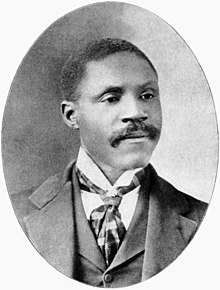George W. Murray
George Washington Murray (born September 22, 1853 in Rembert , Sumter County , South Carolina , † April 21, 1926 in Chicago , Illinois ) was an American politician . Between 1893 and 1897 he represented the state of South Carolina in the US House of Representatives with one interruption .
Career
The African American George Murray was born a slave in 1853 . After the end of the civil war and the abolition of slavery that went with it, he attended the public schools in his homeland. Then he studied at the University of South Carolina in South Carolina . Murray taught as a teacher in Sumter County for 15 years.
Politically, he was a member of the Republican Party , whose chairman he was in Sumter County. Murray was also a delegate to several Republican National Conventions . He also gave agricultural lectures for the African American Farmer Association. Between 1890 and 1892 Murray was a customs inspector in the port of Charleston . In 1892 he was elected to the US House of Representatives in Washington, DC in the seventh constituency of South Carolina , where he succeeded William Elliott on March 4, 1893 . By March 3, 1895, Murray completed a regular term in Congress . In the elections of 1894 he ran unsuccessfully in the first district against Elliott. However, he appealed against the outcome of the election. Until a decision on this matter was made, Elliott was a member of Congress. On June 4, 1896, Congress ruled in favor of Murray, who on that day took over the mandate from Elliot and ended the current legislative period until March 3, 1897.
After his tenure in the House of Representatives ended, George Murray got into the real estate business. In 1903 he was charged with forging names on contracts. In 1905 he was therefore sentenced to imprisonment as a chain convict with forced labor. Murray escaped punishment by escaping to Chicago. There he worked again in the real estate industry. He also sold insurance. He was also involved in the Illinois Republican Party and became a friend of the possibly corrupt Chicago Mayor Bill Thompson . In Chicago, Murray also dealt with literary affairs. In 1915 he was pardoned in South Carolina by Governor Coleman Livingston Blease . Murray stayed in Chicago, where he died in April 1926.
Web links
- George W. Murray in the Biographical Directory of the United States Congress (English)
- George W. Murray in the database of Find a Grave (English)
| personal data | |
|---|---|
| SURNAME | Murray, George W. |
| ALTERNATIVE NAMES | Murray, George Washington (full name) |
| BRIEF DESCRIPTION | American politician |
| DATE OF BIRTH | September 22, 1853 |
| PLACE OF BIRTH | near Rembert , South Carolina |
| DATE OF DEATH | April 21, 1926 |
| Place of death | Chicago , Illinois |

